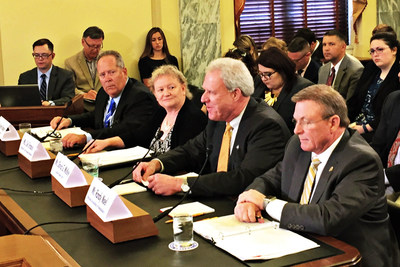Flood insurance costs continue to put small businesses and homeownership at risk, but the National Association of Realtors® told U.S. Senators today that a range of solutions are on the horizon.
David McKey, 2016 vice chair of NAR's Insurance Committee, testified on NAR's behalf before the Senate Small Business and Entrepreneurship committee. McKey told Senators in attendance that Realtors® continue to report that their clients face significant hurdles due to excessive flood insurance costs and future uncertainty.
"Despite everything that's been done on this issue, the threat of a$30,000 flood insurance premium still looms," said McKey. "A few years ago, the uncertainty over future rate increases was enough for buyers to direct Realtors® not to show them any listings in the floodplain. That's enough to worry business owners and homeowners alike, and it's something that needs to be addressed."
In his testimony, McKey praised the "Homeowner Flood Insurance Affordability Act," which became law in 2014 and reined in the most inaccurate rate increases across the country. Before the Affordability Act, thousands of small business owners faced immediate and excessive rate increases under FEMA's implementation of the "Biggert Waters Flood Insurance Reform Act of 2012."
But McKey warned the committee that significant concerns still remain. He noted that even now, rates continue to rise exponentially by 25 percent each year until policy-holders reach their "full-cost rate."
For a business or a homeowner to prove that they've reached the full-cost rate, they must hire a licensed surveyor and provide FEMA with a costly elevation certificate. If the certificate shows that the property owner has already reached full cost, the owner may request an optional full-risk rating to end the 25 percent increases. Otherwise, the increases continue.
This creates what McKey described as an "endless escalator" of rising costs for businesses and homeowners.
Although it isn't possible to determine how many properties will ultimately be affected, current estimates show that roughly 1 million properties have subsidized insurance rates that may be subject to significant increases.
McKey reiterated NAR's support for a range of solutions to address the problem, including:
- Reauthorizing the National Flood Insurance Program, which sunsets in October 2017;
- Using advanced technology to improve the accuracy of flood maps to provide the data needed to determine how many face unaffordable rates and also reduce the number of property owners who have to file expensive appeals; and
- Fostering a private insurance market to complement the NFIP.
Additionally, McKey suggested an NAR-backed strategy for actually preventing flood damage. By authorizing the use of funds to proactively mitigate properties located in hazard areas, McKey noted that it's possible to protect property owners while saving taxpayers' money. This might include flood proofing, elevating, or otherwise strengthening a property.
Unfortunately, while funding is currently available for mitigation efforts, funds typically aren't accessible until after a flood event, when costs are higher and the damage has already occurred.
"Realtors® see the effect of rising flood insurance rates firsthand in their businesses and in the local communities," McKey said. "But commonsense solutions to the problem are well within reach. NAR is thankful for the opportunity to testify and applauds the Committee's attention to this important issue."
David McKey is the managing broker/owner of Coldwell Banker One in Baton Rouge, Louisiana, and was the 2013 president of the Louisiana Realtors® Association.
The National Association of Realtors®, "The Voice for Real Estate," is America's largest trade association, representing 1.1 million members involved in all aspects of the residential and commercial real estate industries.

No comments:
Post a Comment